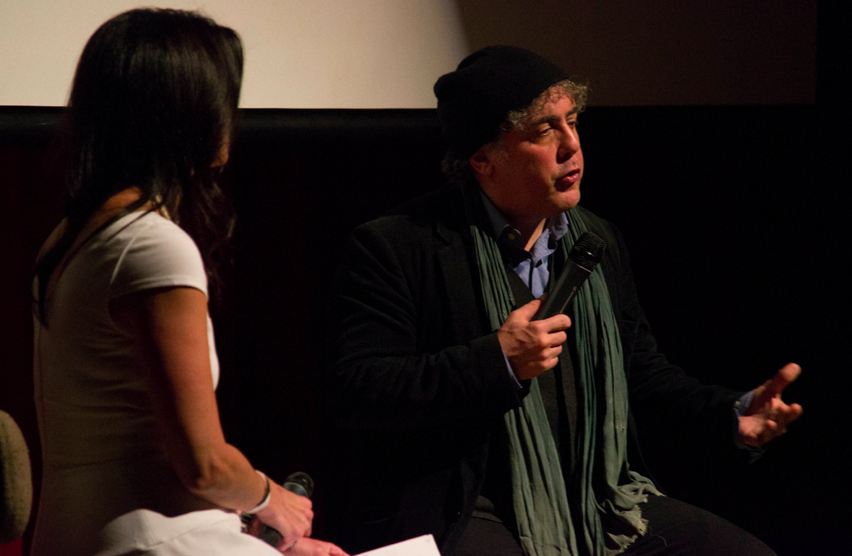Gems Not Genocide: Witness. Inspire. Act.
On April 22, 2014, Gems Not Genocide hosted its first ‘Witness. Inspire. Act.’ Conference in the Harriton auditorium. The conference was led by senior and Gems Not Genocide club founder, Abri Bernstein; club advisor, Mr. Imaizumi; and was moderated by Mrs. Heather Braver.
Six experts on the Darfur genocide gave presentations to inspire the audience to both support Darfur in its fight to end the genocide, and make change in the world by pursing interests and passions.
“You have to start somewhere, because no one will hold your hand,” said Mr. Imaizumi in his opening speech. He set the audience up for the theme of the night; people need to get involved in something they believe in and should want to make a change in the world, but they need to start with what may seem like the smallest action.
Six expert panelists of different backgrounds — Ron Haviv, Hawa Abdallah Muhammed Salih, Victoria Kristiansson, Niemat Ahmadi, Megan Higginbotham, and Jonas Claes — gave powerful speeches and stories that inspired listeners to find their passion and use it to make a difference.
The keynote speaker, Ron Haviv, is an award winning photojournalist. He has produced images from the genocides in Rwanda, Bosnia, and Sudan. His images capture truth and deliver a sense of reality to those who view his work. He spoke about becoming inspired to capture these photographs and how “we are all capable of certain amounts of violence,” explaining that the level of violence a human demonstrates depends largely on their circumstances.
Next, Hawa Abdallah Muhammed Salih, a human rights activist and a surviver of the Darfur genocide, took the podium and inspired us with her stories of near death experiences. Salih was forced to flee her home in 2011 when she had been persecuted and detained by the government of Sudan, while fighting for womens’ rights. She wanted young women to fight for their rights, specifically in Sudan, but also in places near them. She said “Please stand up. Please support young women. Fight for their human rights.”
Victoria Kristiansson was the next speaker, an attorney advisor for AEquitas, a firm whose goal is to protect women from sexual abuse. The genocide in Darfur is transforming the territory’s societal structure. Females in Darfur were once regarded with utmost respect; however, today, the government and groups responsible for the hateful acts against Darfur’s population are taking advantage of women in an effort to reaffirm power. Kristiansson’s message to the audience was to find something you are passionate about and “run into the fire,” as she has done in her career.
Neimat Ahmadi, a genocide surviver and founder of the Darfur Women Action Group, told the audience powerful stories about her experience. After fighting for women’s rights during the genocide, the government was trying to find and kill Ahmadi. When another women was mistaken for Ahmadi and killed, her family told her not to come back home and encouraged her to flee to America. Her journey to America and leadership in the field of womens’ rights and stopping the genocide in Darfur serves as model for all those who would like to get involved in making the world a better place. Ahmadi concluded by saying, “I know that your voice will help, and I want you to speak for them.”
Megan Higginbotham, the next panelist and a human rights activist, works for the Enough Project, a program working to stop the Darfur genocide. She gave listeners many ways to get involved. She made it clear that the genocide in Darfur is not over. Higginbotham wanted Harriton students to not only get involved in helping to stop the Darfur genocide, but also get involved in things they are passionate about by starting a new club, fundraising, volunteering, and educating others to raise awareness about conflicts that are going on in the world.
The final panelist, Jonas Claes, works for the U.S. Institute of Peace, which works towards the prevention of genocides. He spoke about how important it is to get involved in preventing all genocides from continuing. He said that “the importance of preventing genocides and mass violence starts with the country itself,” explaining that people need to first become tolerant of other cultures so they can understand what they are going through on a more intimate level, and work towards ending the injustices.
Following the keynote address by Ron Haviv, there was a brief intermission so attendees could have a snack and digest the powerful information discussed. Following the intermission, Harriton junior and accomplished cellist, Bihn Park, performed for the audience. His performance exemplified the kind of passion many of the presenters alluded to in their speeches.
This three-hour conference, lasting from 6 PM to 9 PM, was an enlightening experience experience for all in attendance. The panelists’ diverse backgrounds and areas of focus worked in tandem to communicate to the audience that the genocide in Darfur, and acts of hatred in general, is a global issue. It also serves as a reminder that, regardless of one’s passion, there is a way to help.
If you want to make a difference in stopping the Darfur genocide and are interested in making a change, join the Gems Not Genocide club next year and look out for future events.
Photos taken by Jamie Lazarus.



